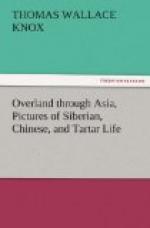After the ceremony of introduction was ended the sargootchay signed for us to be seated. He took his own place on a divan, and gave the ‘illustrious stranger’ the post of honor near him. Tea and cigars were brought, and we had a few moments of smoky silence. The room was rather bare of furniture, and the decorations on the walls were Russian and Chinese in about equal proportion. I noticed a Russian stove in one corner and a samovar in the adjoining room. The sargootchay had been newly appointed, and arrived only a week before. I presume his housekeeping was not well under way.
The interview was as interesting as one could expect where neither party had anything important to say to the other. We attempted conversation which expressed our delight at meeting and the good-will of our respective countries toward each other. The talk was rather slow, as it went through many translations in passing between me and my host. Tea and smoke were of immense service in filling up the chinks.
When I wished to say anything to the sargootchay I spoke in French to Major Boroslofski, who sat near me.
The major then addressed his Bouriat interpreter in Russian.
This interpreter turned to a Mongol-Chinese official at his side and spoke to him in Mongol.
The latter translated into Chinese for the understanding of his chief.
The replies of the sargootchay returned by the same route. I have a suspicion that very little of what we really said ever reached its destination. His reply to one remark of mine had no reference to what I said, and the whole conversation was a curious medley of compliments. Our words were doubtless polarized more than once in transmission.
We had tea and sweetmeats, the latter in great variety. The manner of preparing tea did not please me as well as the Russian one. The Chinese boil their tea and give it a bitter flavor that the Russians are careful to avoid. They drink it quite strong and hot, using no milk or sugar. Out of deference to foreign tastes they brought sugar for us to use at our liking. After the tea and sweetmeats the sargootchay ordered champagne, in which we drank each other’s health. At the close of the interview I received invitation to dine with His Excellency two days later and witness a theatrical performance.
Our adieus were made in the European manner, and after leaving the sargootchay we visited a temple in the northern part of the town. We passed through a large yard and wound among so many courts and colonnades that I should have been sorely puzzled to find my way out alone. The public buildings of Maimaichin are not far from each other, but the routes between them are difficult for one whose ideas of streets were formed in American cities. On passing the theatre we were shown two groups larger than life in rooms on opposite sides of a covered colonnade. They were cut in sand-stone, one representing a rearing horse which two grooms were struggling to hold. The other was the same horse walking quietly under control of one man.




